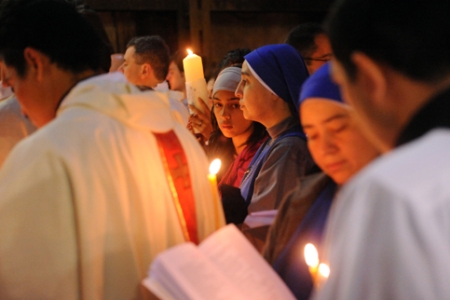Holy Land Christians face difficult plight, says Franciscan president
NEWTON -- Picture living in Newton and that the town has no schools, no hospitals and no employers. Every day for 45 years you go to work in Boston until the day you are turned away at the border. You lose your job, your children cannot get an education and if you or a loved one becomes ill, there is no medical help available.
This scenario, proposed by Father Peter Vasko, OFM, to members of the Equestrian Order of the Holy Sepulchre of Jerusalem, illustrates the plight of Christians in the Holy Land. Father Vasko, president of the Franciscan Foundation for the Holy Land, spoke at the order's northeastern annual gathering at the Marriott Hotel in Newton on Oct. 16.
Speaking on "Christian Turmoil in the Holy Land," Father Vasko said that American citizens would be incensed if their mobility were barred because of the actions of a small number of terrorists.
"At what price do you punish an entire people because of 10 terrorists? Arrest those terrorists. Put those people in jail, but for God's sake, don't blame every man, woman and child because they happen to be called Palestinian," he said.
Father Vasko added that it is not only Palestinians whose movements are barred. This past Easter at the Church of the Holy Sepulchre there were more Israeli police than Christian believers because Israel refused to let the Christians, fellow Jerusalemites, come to that church to celebrate Holy Week.
June marked the 43rd anniversary of Israel's occupation of Palestine. In those years, 450,000 Jewish settlers have moved to land that legally belongs to Muslim and Christian Palestinians. Israel evacuated 8,000 settlers from Gaza in 2005 but has increased and expanded settlements in the West Bank. In addition, at the end of September this year, the government lifted its 10-month moratorium on building more settlements, he said.
The conflict between Muslims and Jews in the Holy Land leaves Christians caught in the middle, he said. Nearly all the Christian communities in the Middle East predate the rise of Islam in the seventh century.
"The Israeli government looks upon Christians as Arabs, as Palestinians, and, hence, the enemy. While at the same time on the opposite side, you have the militant Muslims who look at the Christians, their neighbors, as what? As pro-West and traitors to the Islamic cause," he said.
"Since the Hamas coup in July 2007, Islamic militants, empowered by the indifference of the authorities, have begun to target Christian institutions and individuals in Gaza with increasing impunity," he said.
Father Vasko added that many Palestinian Muslims want to live in peace with Israel.
Because of these political problems and the difficulty of finding work, many Christians are leaving the Holy Land, he said. Currently, 35 percent of Palestinians are unemployed while 7 percent of Israelis are unemployed. Sixty-five percent of Palestinians live below the poverty line, set at $4,000 a year.
If nothing is done to stem the Christian exodus, in 60 years all that will be left are empty religious monuments without a living, worshipping community, he said.
Christians currently make up less than two percent of the population in the Holy Land, down from 13.3 percent in 1900. Just 35 years ago, Bethlehem was 70 percent Christian and 30 percent Muslim. Today those percentages are reversed.
Father Vasko said the key to keeping young Christians in the Holy Land is higher education. Education leads to employment, which allows them to find housing. Christians have a moral obligation to ensure that there is always a Christian presence in the Holy Land, where the very roots of Christianity began.
For decades, Israel and Palestine have been locked in a conundrum, he said.
"Israelis will not be able to enjoy greater peace and security until Palestinians have achieved more control over their lives and land. And Palestinians will not fully realize peace and justice until Israel builds a fence of security. Extremists, my dear people, on both sides know this, and they have exploited it with their tactics," Father Vasko said.
He added, "For those who care deeply about human suffering, these episodes I think naturally evokes tears of sadness, incredulity at the lack of empathy on all sides, anger at how little anyone seems to have learned from the past and moments of despair to once again see the religious and democratic ideals subordinated to the cynical realism of militarism."



















